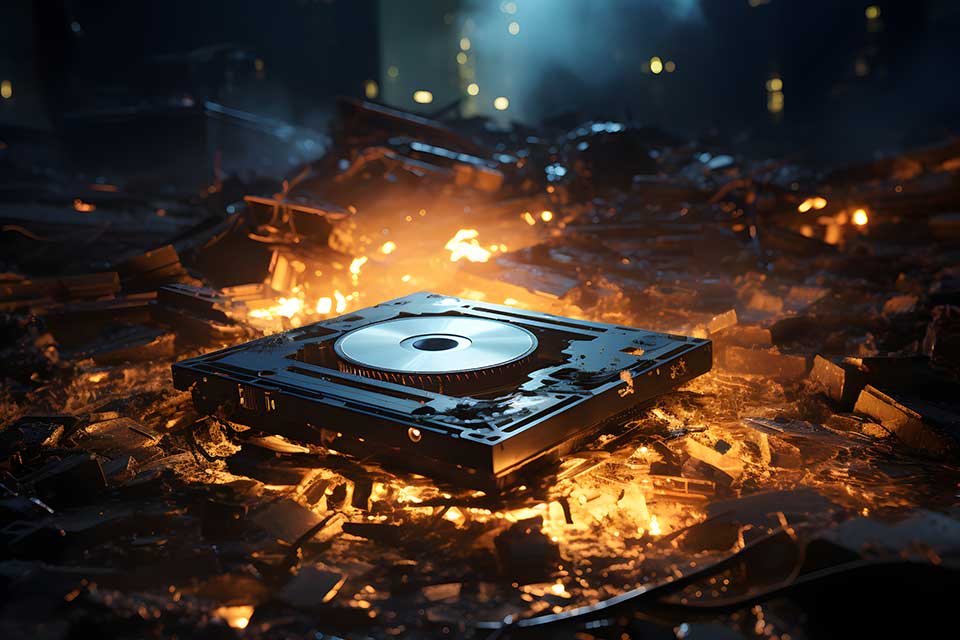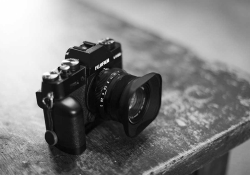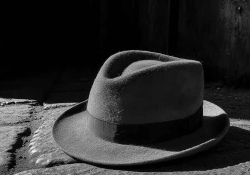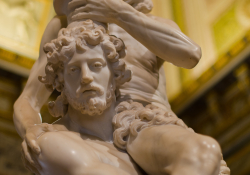Tempestuously, with Great Vehemence

after Mahler’s 5th Symphony, 2nd Movement –
Stürmisch bewegt, mit größter Vehemenz
The explosion had wrecked the whole street; only this one window was left undamaged. Clearly a shop window. The panes to the left and right, together with the door, had been blown in, as they had on all the other houses in the street. Just one grenade, he thought.
And then he thought, Finish the job. With a quick jab of his rifle butt, he smashed in the remaining pane. It went down with a crash. He used the barrel of his gun to carefully break off the pieces still sticking to the frame, both the jagged shards and the tiniest slivers. He’d always made a point of thoroughness. Carefully, he felt along the lower edge of the window frame with his gloves. It was smooth. He swung first his right, then his left leg through the opening, then felt for the floor with his feet. Broken glass crunched beneath his boots. Calmly he looked about the room, its silence disrupted by the creaking of his heavy jacket. Everywhere there were waist-high tables, each filled with shelves of CDs. Several had broken legs, and the CDs had spilled onto the ground like small, sparkling waterfalls, some still in their cases, others not. Iggy Pop creaked beneath his feet. Obliviously, he trod on Joni Mitchell’s face. A Woodstock poster curled from the wall. The paper had been torn across the word PEACE, and the A and the C could barely be made out.
Suddenly he felt the urgent need to pee and, in a powerful stream, emptied his bladder onto a vinyl disc hanging from the wall. Bull’s eye, he thought with satisfaction. Then he heard his mother’s voice; wash your hands. The lavatory door stood ajar, as if frozen in midmotion. At the bottom of the pan lay a turd; clearly someone hadn’t had the time to flush it. Perhaps the flush hadn’t worked anymore. A pipe protruded from the side wall. He turned on the tap above the basin, but no water came. Lovis examined the hinge on the lavatory door, pressed it back into its warped frame, and returned to the shop.
The pieces of glass were scattered evenly over everything: across the floor, over the furniture, on the seats of two armchairs standing next to each other in a corner. Over the back of one of these hung a pair of headphones, as if someone had only just left them there. Everything was covered in glass and debris. He pulled a mobile phone out of his pocket and took a picture. A bit of culture for today, he wrote, and sent it to Milan, his best friend, who had recently joined the army and was serving in another regiment. He’d been out in the field for weeks where, perhaps, his batteries had run out. For days, Lovis had heard nothing from him.
Dust and debris covered what was left of the shelves. Next to the door was a stack of plastic boxes which had melted into each other from the heat of the explosion. He flicked through various compartments and pulled out several different cases. Almost all of them were broken. Elton John’s glasses had been blown off. Tiny cracks ran across his jacket, which—if held up to the light—might be mistaken for sequins. Michael Jackson’s head was torn off, and a burn line ran across Beethoven’s forehead. Pieces of shrapnel had added stars to the flag on the cover of Bruce Springsteen’s Born in the USA. John Lennon’s chest was a gaping hole. Who still listened to this music? Michael Jackson’s Thriller, one of the few albums his father had been obsessed with. He pulled out a copy of Nirvana’s Nevermind. Countless people had told him that they could remember where they were when they heard that Kurt Cobain had shot himself—at least as many who said they still knew exactly where they were when the Twin Towers fell.
Tiny cracks ran across Elton’s jacket, which—if held up to the light—might be mistaken for sequins.
He looked around a bit more. On the bottom right side of a stereo gleamed a tiny red dot. Was it just a reflection of the light, or did the thing actually still have power? Lovis pressed the on/off button in the middle. Sure enough, the whole front of the device lit up, and the CD compartment slid out automatically. A cable hung from the wall, to which a speaker must once have been attached. It had been blown off. But there was still power. Just one grenade, he thought. He went on rifling through the CDs; then he suddenly found himself seized by a desire. They had been city people; they had loved the crowds and the clubs. True, there was no trace now of what they’d once danced to. This stuff was all junk. Weird abandoned retro.
He noticed an untouched cardboard box lying in what was left of a drawer. MAHLER appeared in capital letters on its cover; beneath it, in smaller letters, Gustav; and smaller still, L. Bernstein and the New York Philharmonic. The box contained a total of ten CDs, all of them in pristine condition. Untouched by the explosion. It felt like he was looking at something from another time. The topmost box was marked Fifth Symphony. Lovis took the gleaming disk out of its box and turned it this way and that. Not a single scratch on it. He placed it in the CD compartment, which slid back silently into the machine. He pressed play and waited. Apart from the quiet fumbling of the laser, all was silent.
Then a trumpet, as clear as a fanfare. It sounded from several speakers around him simultaneously. The trumpet, then the drums and a couple of strings, which took away the first shock. But the eeriness persisted; in fact, it spread. He was on the verge of turning the sound down. Then the violins soothed him again.
He must have been sixteen when his grandfather had taken him to the concert. They’d also played Gustav Mahler: The Song of the Earth. He could remember the title exactly. He’d always thought that someone should give a painting the same name. The high voices of the women had bothered him; he’d wished them off the stage. He had sat there restlessly. His grandfather had put his hand on Lovis’s knee several times to make him sit still and kept whispering, “Listen, kid. Just listen.” Quietly but firmly. But Lovis hadn’t been able to think of anything, except how much he wanted a cigarette. All he’d felt was irritation at the high voices and the urgent need for a cigarette. He hadn’t been smoking for long, at most a couple of months. Perhaps you couldn’t really call it smoking at all. At the time, Milan was nicking whole packets from his father, taking the blame for it, and sharing them with him. When he sat down for a smoke with his friend, it was more out of a sense of obligation. At the concert, in the middle of The Song of the Earth, it had emerged as a great longing.
Could he smell smoke? Since the beginning of the war, he had gotten used to the fact that there was always something burning somewhere, always something smoking, always something roasting. But now when he thought of that cigarette, the cigarette he had never smoked, the cigarette he had yearned for so much while sitting next to his grandfather, he could smell the fumes and smoke around him so distinctly that it almost made him feel sick. He wiped his face with the sleeve of his uniform, and the scratching of the coarse material obliterated the memory.
In the meantime, the sound of the orchestra had filled the entire room. It came from everywhere, like a powerful force now surging from within. He had never found dealing with feelings easy; there was nothing easy about having feelings. Often they would assail you unexpectedly. From every direction, like the music from all the speakers. Some playing clearly, some crackling, some with a static hiss. At one point the feelings seemed to be pressing from within him; then the room filled again with sounds on which they seemed to ride in triumph, then it became a kind of wild rodeo. Suddenly a profound sadness descended; then he was encircled by a comforting cloud. Here and there, strings, drums, and winds sounded.
The room filled again with sounds on which they seemed to ride in triumph, then it became a kind of wild rodeo.
Again the fanfare; this time it sounded much sadder. Then all the instruments together—it was as if they were lifting him up, as if he had stood on the stage of a rock concert and leapt into the crowd and the crowd had borne him up. As he was safely passed from hand to hand, he felt himself become almost weightless. Then the flutes grew quiet, and doubt permeated everything. Amid this doubt, two hesitant drumbeats sounded a warning. Enough, finish, silence. But then again the fanfare, as if it were trying to call everything to order.
One after the other, he inspected the speakers hanging from the shop ceiling. Some dangled from the wall by their cables; two had been completely torn out, their bodies lying crushed in the rubble. Lovis listened carefully to each one; one of the speakers crackled, another buzzed or whistled according to the intensity of the music. He turned the music up, then up some more; the drums had set up a frenzied barrage.
The sounds were still clear. There was no buzzing, rattling, or clattering. Just the drums and the orchestra. He settled himself into a corner and stifled a sob. Don’t cry, or you’ll turn into a sobbing wreck. Don’t cry, don’t fall asleep, don’t make a fuss. If you absolutely have to, kick, scream, or swear. He wiped his eyes again with the rough sleeve of his uniform, slapped himself three times on each cheek, and loudly struck the floor with his rifle butt. Twice. The glass crunched beneath his feet like snow in subzero temperatures. He felt every anguish of the entire war, every stab of grief that he’d suffered and that the enemy had suffered, felt every arm torn off, every leg sliced open, every skull shattered, every child terrified, every woman raped, every horse startled, every dog dying under the rubble, every flock of crows taking flight in panic.
A blaring triumphal march intruded upon his grief.
A blaring triumphal march intruded upon his grief; just a couple of notes, something barely hinted at, and then it withdrew again. He thought of every piece of filth, every cowardly scumbag. He thought of all the garbage he’d had to eat, and again his stomach turned over. He saw the saboteurs in front of him, whom he would never have joined. Saw the bloodstained uniforms that clothed dead bodies. Bodies of his own people or bodies of the enemy. Dead was dead. Death was death. What was worse was when the bodies in the bloodstained uniforms were still alive, wounded, torn to shreds, screaming with pain, writhing, begging for help, calling for their mothers, for their wives, worst of all for their children. When these bodies were still moving, when they were still groaning or their breath still rattling, when you had to make a decision. Finish them off, or try to save them? Stay? Run? Be glad it wasn’t you lying there. Feel some of their suffering? Or hate and loathe their suffering?
What was this now? The hint of a waltz. Everything was turning. And a tinkling of bells, as if a sleigh were passing. And within it this bass rising from the depths of the sea. His head reeled in one direction, his stomach in another. A euphoria of a kind he hadn’t felt for a long time, and at the same time a nausea. He doubled over, retched, trying to vomit. But before he could, the cramps disappeared. Instead it felt as if his skin were being torn from his body, and with it pieces of his flesh. The music had forced him to be human again. But he wasn’t; not anymore. He was a soldier.
They’d done well, no doubt about it. They’d liberated this village only the week before. The people had greeted them with open arms. They had cooked and baked for their liberators, with whatever they could scrape together. And of course, drink for the whole regiment. Wine and schnaps; who wouldn’t feel like celebrating? Even if they were celebrating amid a graveyard.
There again the fanfare, and again it was enveloped by the violins, then challenged by the contrabasses, before everything seemed to lose its way. Again the softness of the violins, he waited for these moments; he needed these moments. And he was not disappointed. Such softness. Such softness as these violins had; as soft as down. To have such softness, and to remain so. To linger among these violins, to sleep amid them. Already, though, the winds were calling for him.
Suddenly, with the next fanfare, there was a crocodile lolling on the armchair which had had the headphones hanging on the back of it. The crocodile had actually put them on. It snarled at him, beat its tail aggressively, and then seemed to become transfigured, as if the music were soothing its very being, as if it were diving into the music as into a primal element. It panted agreeably. Lovis stood completely still. The crocodile stayed where it was; didn’t take a step nearer, kept its distance, but did not let him out of its sight. Lovis felt no fear; the crocodile was a crocodile, the situation seemed to him completely normal. The war taught you to believe in ghosts. It was something everyone learned.
With the next fanfare, the crocodile disappeared just as suddenly as it had appeared. The headphones were hanging, covered in dust, over the back of the armchair. The music tripped onward. Lovis let out a breath, and then the orchestra began its great finale. He stood there surrounded by the music. Right in the middle of the euphoria and the sound. You’d think it were capable of anything, this euphoria, as if it could hold everything at bay. As if it could take on anything and everything.
You’d think it were capable of anything, this euphoria, as if it could hold everything at bay.
The pain of war dissipates into nothing. The pain of music dissipates into beauty. The pain of music liberates forces. The pain of war is transformed into death. Friendship is a matter of life; comradeship, of death. For the long short moment that the symphony lasted, the music held its own against the great war.
Lovis took the pistol out of its holster and started shooting; he shot the speakers, the CDs, he shot everything to pieces as he climbed backward out of the window and into the street. He ran and ran, and Mahler’s trumpets called after him. With every step he took, the orchestra grew in size and the front line became more blurred. One after the other, the musicians climbed out of the window he had cleared so carefully with the barrel of his gun, the men in their black tailcoats, the women in their long dresses, with violas, violins, horns, clarinets, and oboes in their hands. And the eight contrabasses floated down the ruined street with an unspeakable lightness.
Translation from the German
















